OVENTE Electric Skillet SK11112B In-depth Review
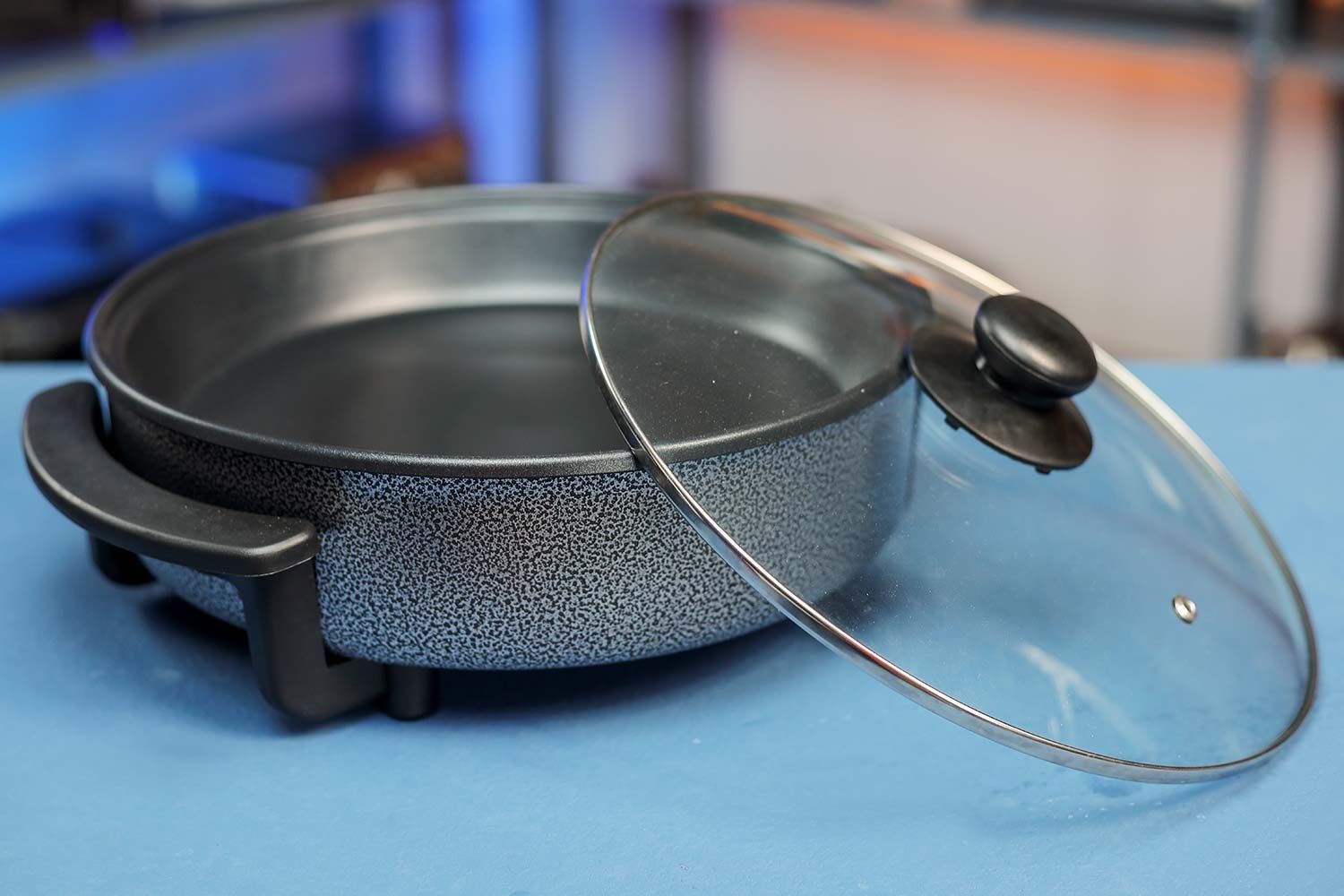
Overall Verdict
Out of all the products we tested, the Ovente Non-Stick Electric Skillet SK11112B was the odd-one-out in both size and performance—but not in a good way.
The rapid heating of the pan suggested it was only good for stir-frying meat and veggies. It proved too hot for delicate foods like pancakes and too unstable for precise cooking like searing steaks.
Fortunately, the 10-inch skillet is double-walled for an “extra layer of burning protection”. On the other hand, the small capacity of 2.5 quarts makes the pan too shallow for liquid-based dishes. Meanwhile, the thin aluminum pan deformed due to higher-than-normal temperatures raising questions about the durability and longevity of the product.
The non-stick coating makes cleaning easy, but not everyone likes Teflon. In conclusion, we don’t recommend this skillet despite it being the cheapest one we’ve purchased to date—$22.30 (at the time of writing).
Things We Like
- Double-wall design
- Lightweight
Things We Don’t Like
- Excessive heat
- Small cooking capacity
- Low build quality
- Teflon non-stick coating
Ovente is a US household brand launched by TopNet Inc. in 2010. They manufacture a wide range of household products and kitchen appliances like air fryer ovens, blenders, and kettles.
Upon unboxing, the Ovente SK11112B felt really light despite the pan’s double-thick walls. In our initial tests, fried eggs cooked in a jiffy while boiling water was shockingly fast. Rather different from other electric skillets, is the Ovente a good choice? See our full test results and hands-on review.
6.1 Performance
The Ovente Non-Stick Electric Skillet SK11112B scored well for heat distribution, and especially high in heating speed. However, no matter how hard we tried, we couldn’t get this skillet to cook decent pancakes or even steaks.
8.2 Analyzing Heat Distribution
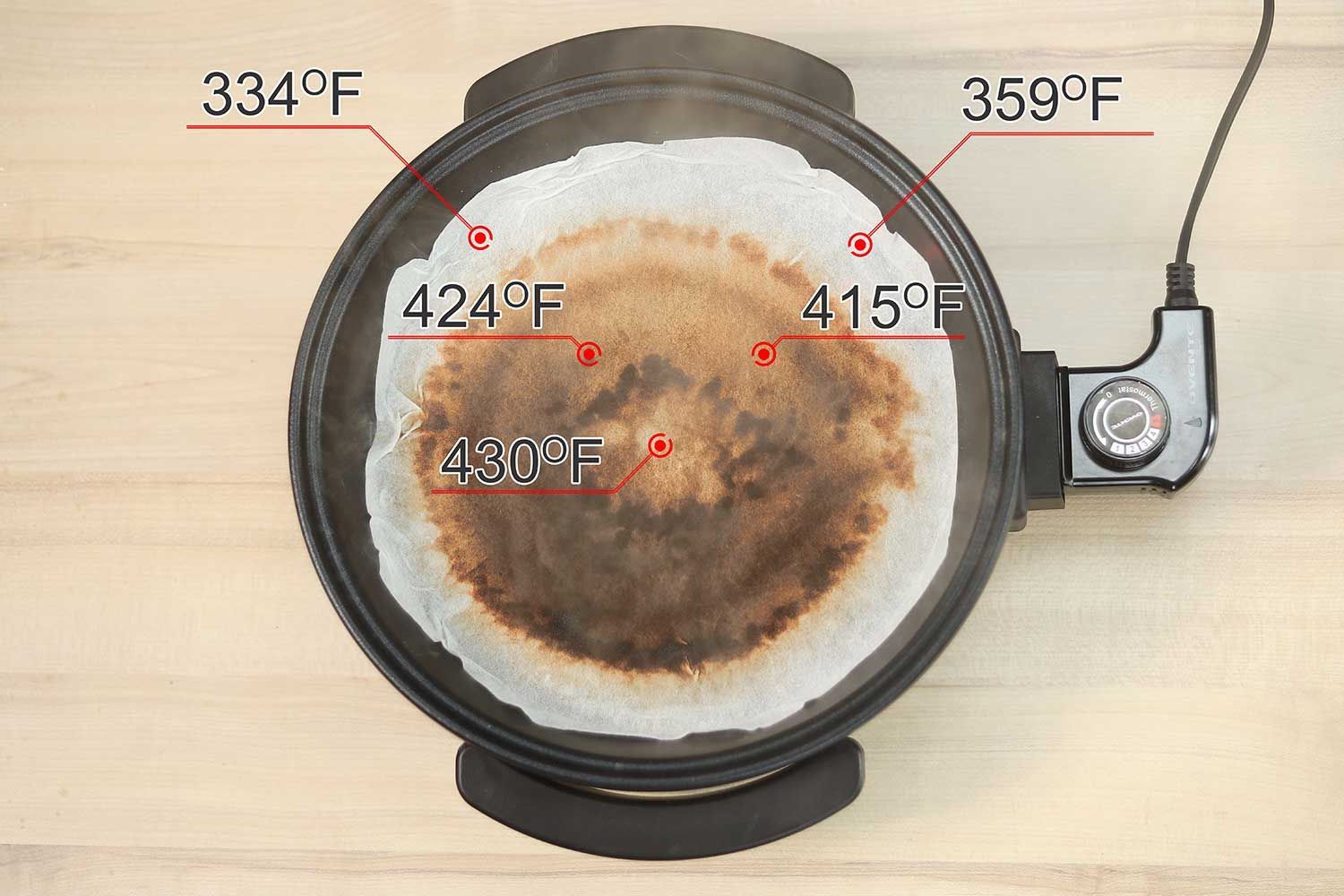
To gauge temperature differences across the skillet's surface, we placed an oil absorbent sheet saturated with sugar water inside. Then, we heated the pan to 400°F and used an infrared thermometer to measure 5 key points.
To its credit, the Ovente had a highly even heat distribution even to the edges. This was surprising considering the thin pan, but the combo of a round pan and round heating element seemed to work well.
Our findings revealed an average 8.8% temperature variance compared to a 10% standard average. This scored an 8.2/10 in our rating system, which was only lower than the Crux 14620 among our medium-sized skillet lineup.
However, with the speed at which the pan heated to 400°F, we were left wondering how cooking pancakes and steaks would turn out.
4.6 Making Pancakes
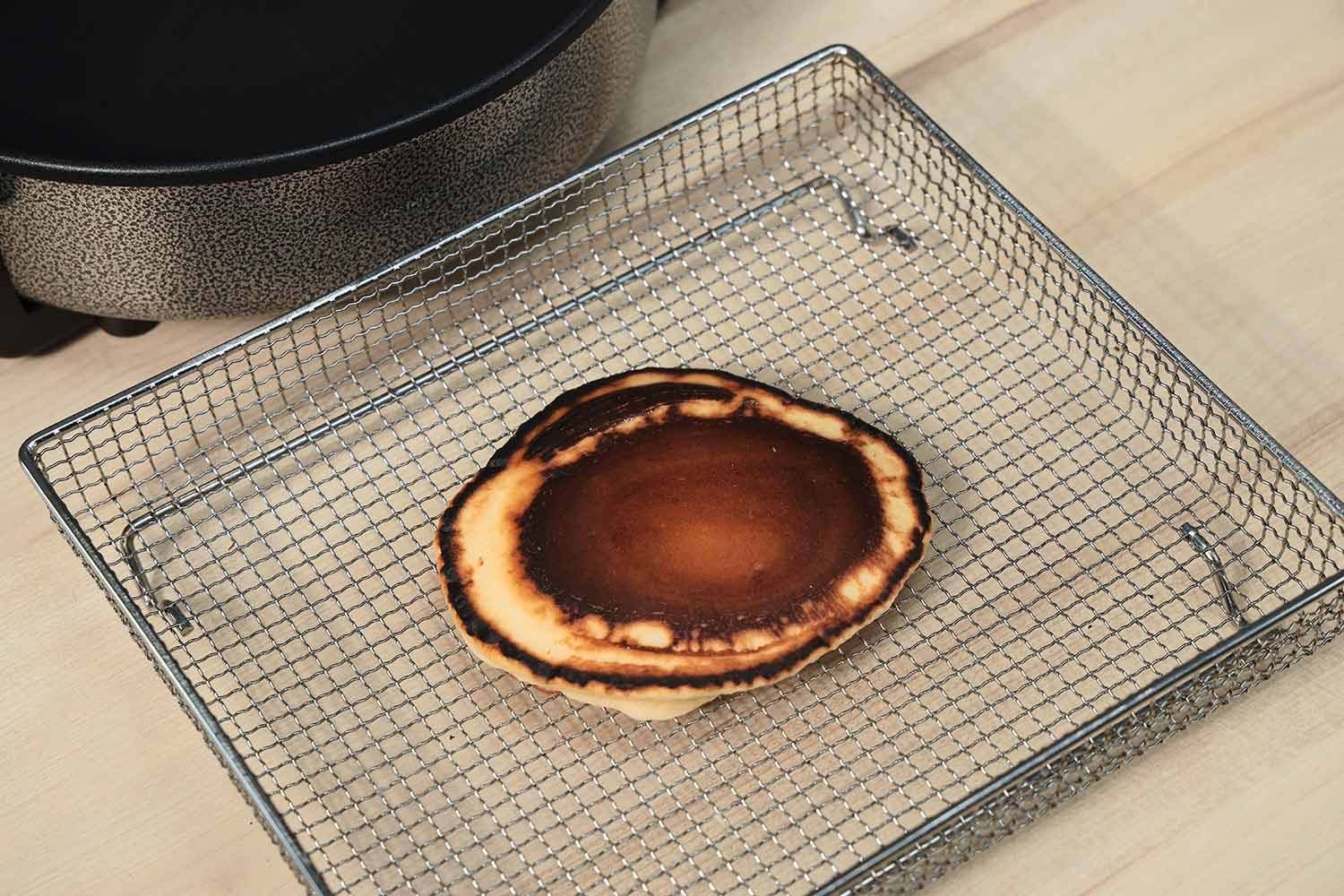

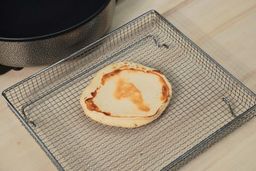
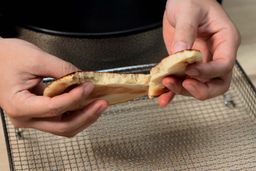
According to the manual, the setting number 3 seemed to be the closest to 350°F on other skillets, so that was what we chose. The manual stated the temperature would oscillate between 304°F to 439°F, so we paid close attention to the heat.
What all that said, the Ovente took only 40 sec to preheat to 350°F, which was mind boggling since 2 min on our benchmark tested scoreboard equaled a 10/10. The higher than normal power draw for a medium skillet, and the thin pan, probably had a lot to do with it.
However, this quickly revealed a major problem—the temperature quickly spiked to near 600°F within the next few minutes. As a result, the top side of our 3.17 oz pancake darkened within 30 sec and we had to quickly flip it.
Another major issue arose, namely the pan took too long to cool down to 350°F before cycling on again due to the high temperature spike. Therefore, even after 3 minutes cooking on the flip side the pancake firmed up without proper browning.
The final nail, however, was that the inside of the pancake wasn’t properly cooked. Our customized pancake batter had worked fine with all other skillets, so only the Ovente could take blame.
In our persistence for excellence, we tried lowering the settings, but still the temperature spikes were too high and the recovery time too long, so the pancakes flopped once more. Our best solution was to leave the skillet running for 5 to 6 minutes for the temperatures to stabilize, but this simply made cooking timely and impractical.
In the end, we had no choice but to score the pancake a 4/10 for edibility—the worst we’ve had so far. Moreover, since the pan is round, we could only fit one pancake while similarly 12‒inch but square pans can fit two or three at a time.
On the only bright side, although we added no oil, the skillet’s non-stick coating still worked. Nonetheless, it's advisable to brush on a thin layer of oil to extend the pan’s longevity.
6.5 Cooking Steaks
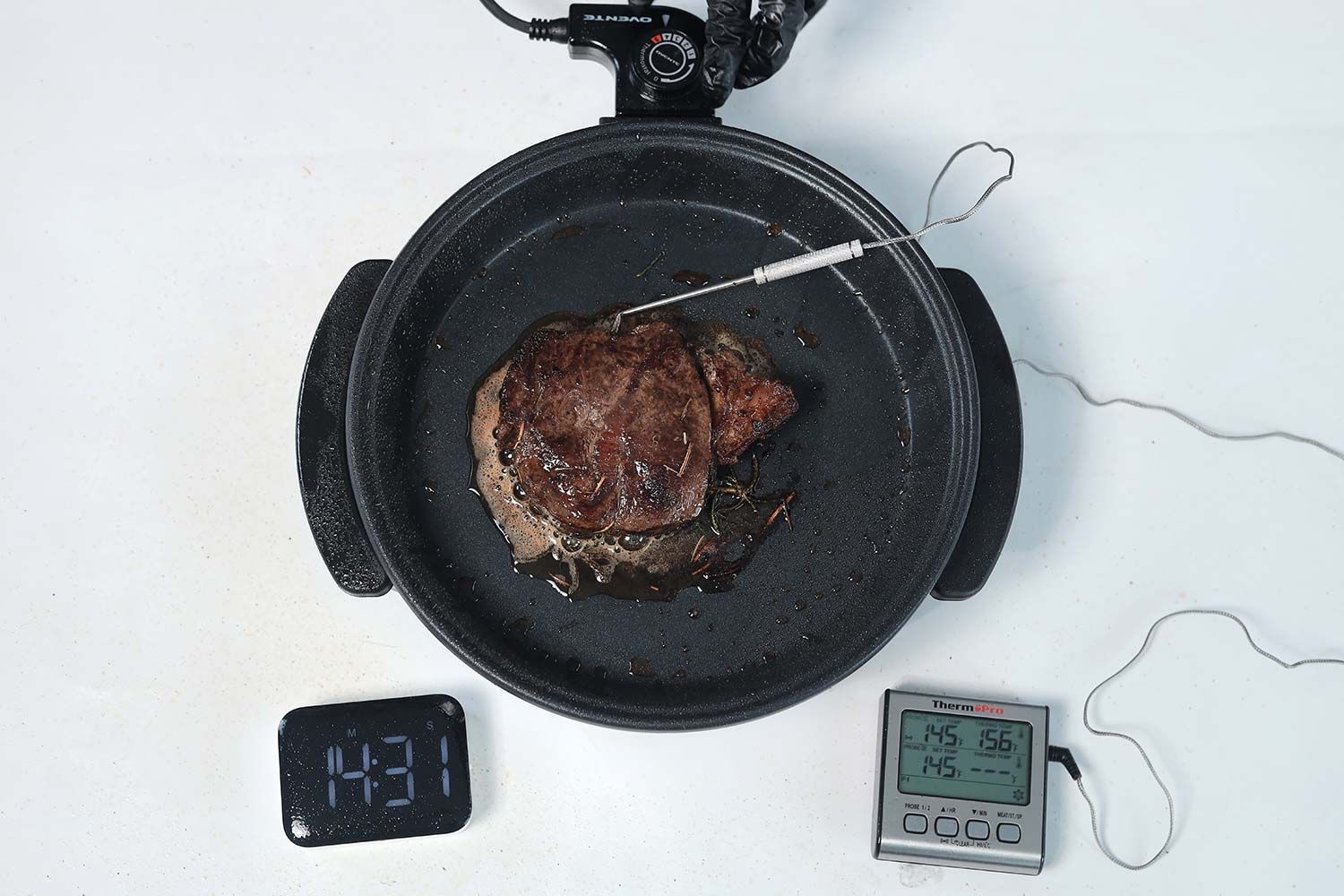

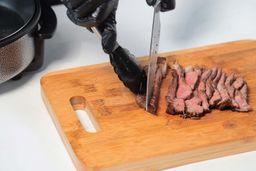
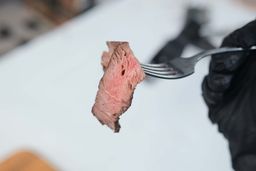
Staying consistent to our test parameters, we chose the fourth setting of the Ovente to cook our 8 oz, 1.38-inch top blade steak. And, the skillet reached 400°F in just 50 sec and earned a score of 10/10 similarly to our pancake test.
Once the steak was seasoned and a meat thermometer inserted, we seared the first side for 3 min and the flip side 3 min 30 sec. By that time, the skillet had cycled on and off twice in an attempt to stabilize the temperature.
Then, the edge with the fat cap needed 2 min, while the remaining edges needed 1 min 30 sec each. Finally, we added fresh rosemary and butter, allowing each side an additional 1 min.
By 11 min 20 sec, the steak’s internal temperature had already reached the required 145°F. Yet, the outside of the steak wasn't properly cooked so our chef decided to go on.
In total, the cooking took 14 min 30 sec and brought the steak’s internal temperature all the way to 156°F. After a 3-minute resting period, the temperature actually decreased to 144°F as opposed to increasing like with the steaks of other skillets.
Therefore, the steak went slightly over medium rare but not yet medium. However, juice had already begun to seep out at around 145°F so the steak wasn’t as tender or juicy as others. The crust had a deep amber color but with all the juice seeping out, it couldn’t maintain a crispy bite.
All of this resulted in a subpar steak that was the worst in our line-up, scoring only a 6.5/10.
To better understand the skillet, we ran it dry and noticed that the temperature stabilized around 400°F after about 5 min.
5.9 Design
The Ovente Non-Stick Electric Skillet SK11112B had all the design features for a worthy skillet. However, its build quality was worrying, especially concerning the pan’s deformation.
In the Box
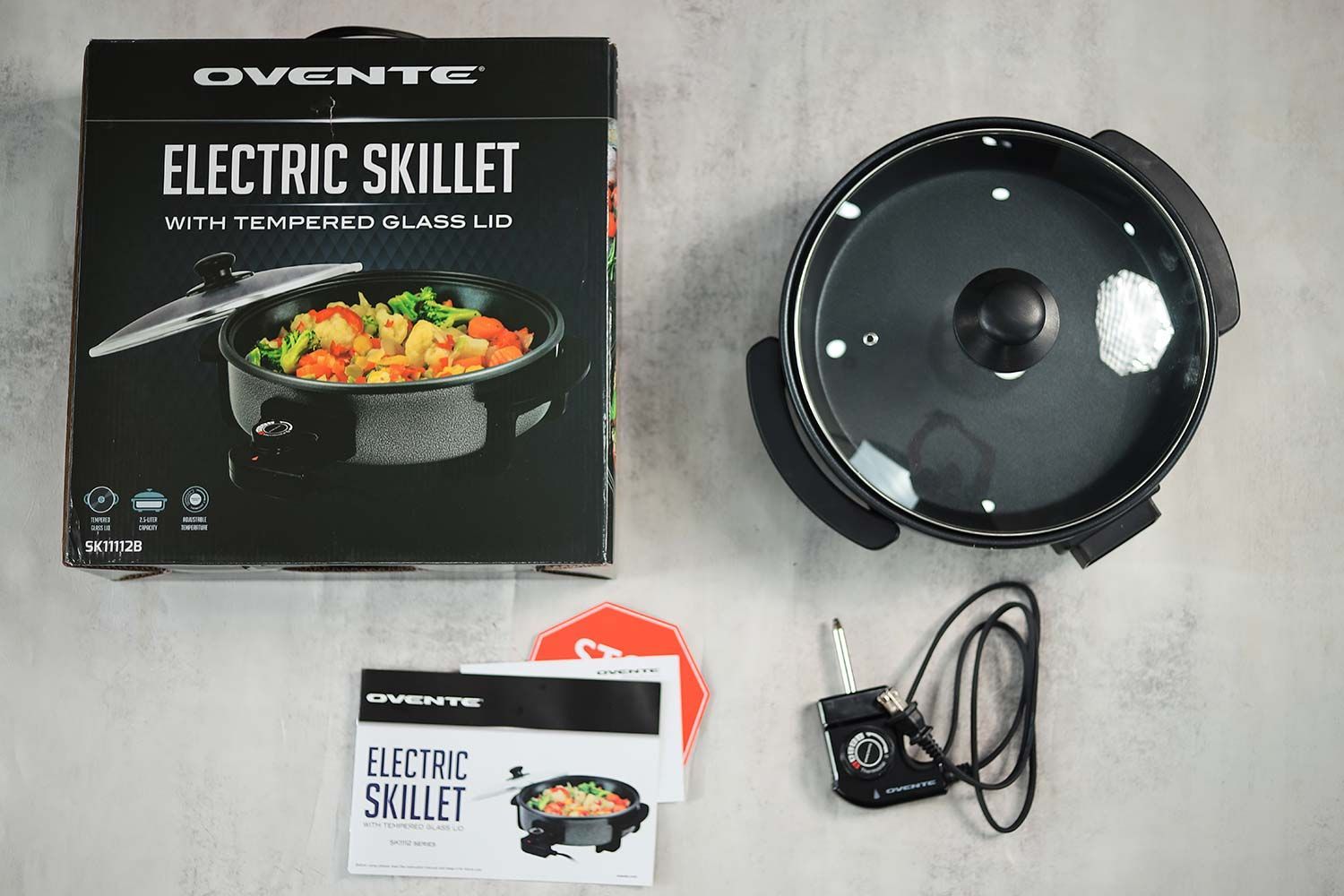
Upon unboxing the Ovente, we received an electric skillet, a pan lid, and a detachable thermostat packaged within a sizable styrofoam pad. The simple instruction manual includes safeguards, parts and features, instructions on operating as well as care and maintenance.
Dimensions
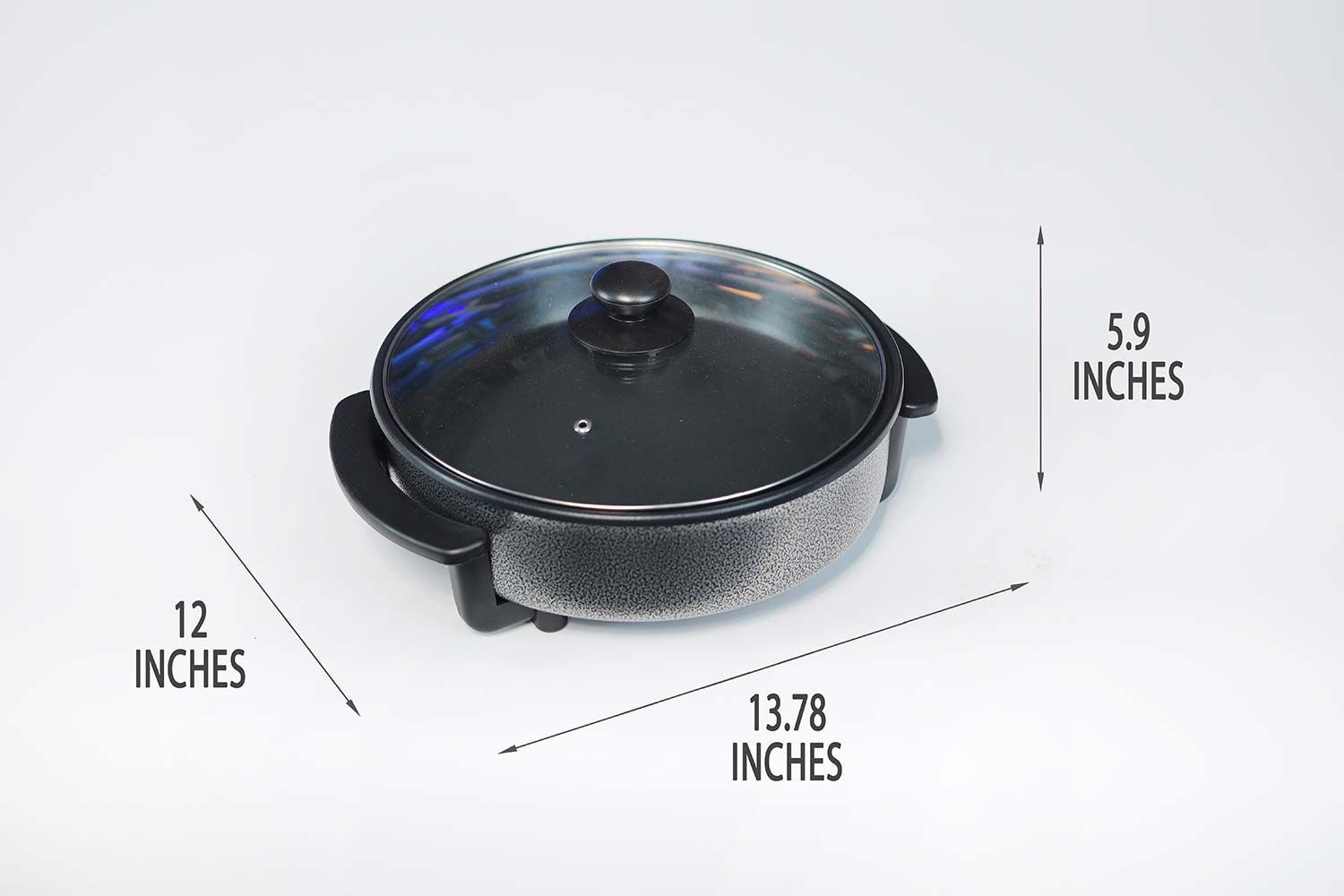
The manufacturer’s dimensions of 13.5"D x 11.5"W x 4"H were slightly different from our hand-measured ones that took the lid’s knob handle into account.
5.0 Pan
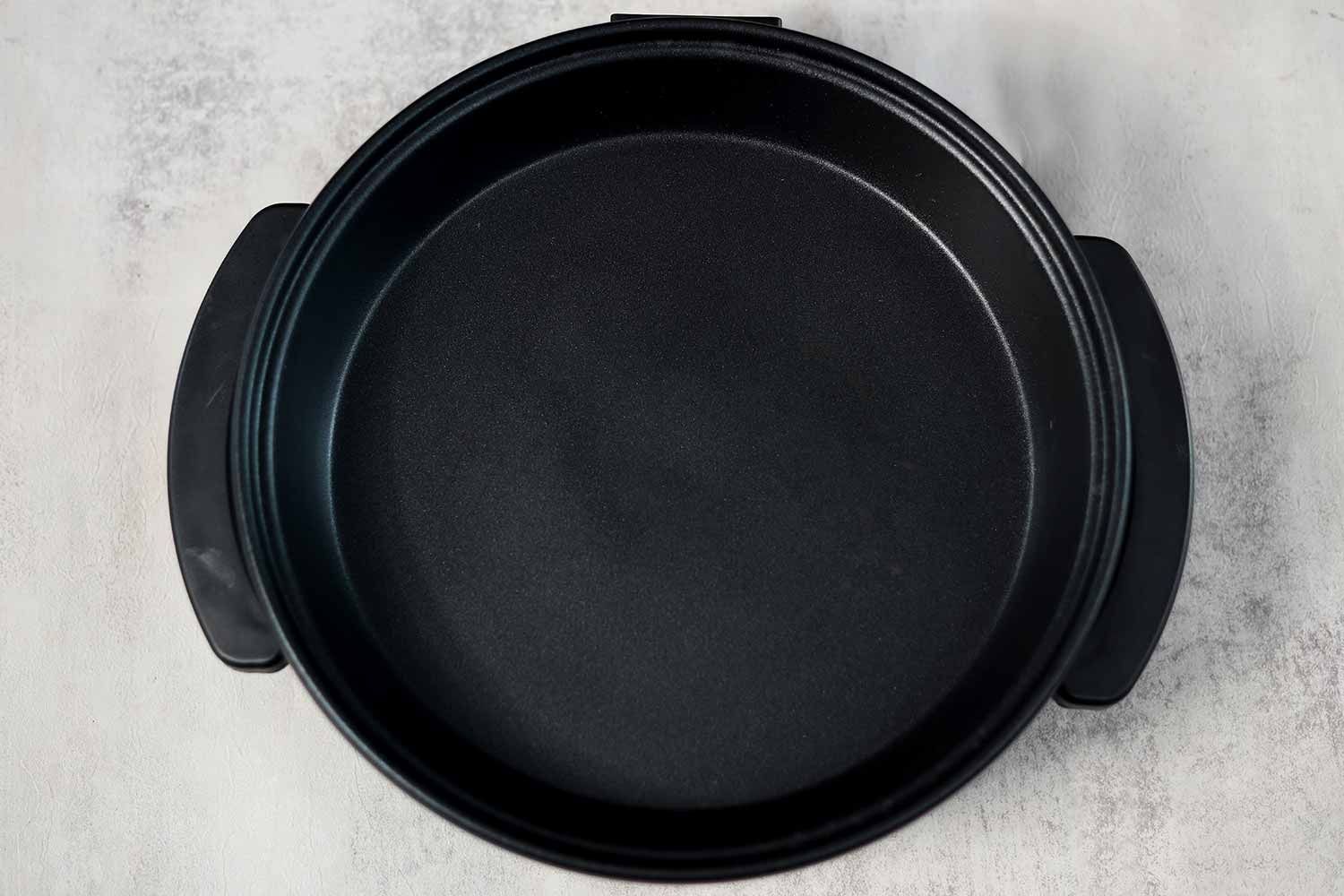
The Ovente skillet has a simple aluminum pan as opposed to most other skillets we’ve tested that have a more durable cast aluminum pan (+1). There is, however, an additional exterior layer covering the pan and heating element (+1).
We calculated the total capacity to be around 2.5 quarts which was quite shallow compared to other 12‒inch skillets such as the GreenLife CC003725-002. Moreover, less than 2 quarts are usable volume.
It’s also the thinnest pan we’ve seen so far being less than 1 mm or 0.04 inches thick (+1), so it came as no surprise that the pan deformed due to high heat (-1). The area above the heating element indented while the area towards the center of the pan expanded upwards.
The pan is dishwasher-safe and has a Teflon non-stick coating (+3). Although cheaper than ceramic coating, some people may see health concerns despite modern Teflon being free of PFOA.
9.0 Lid
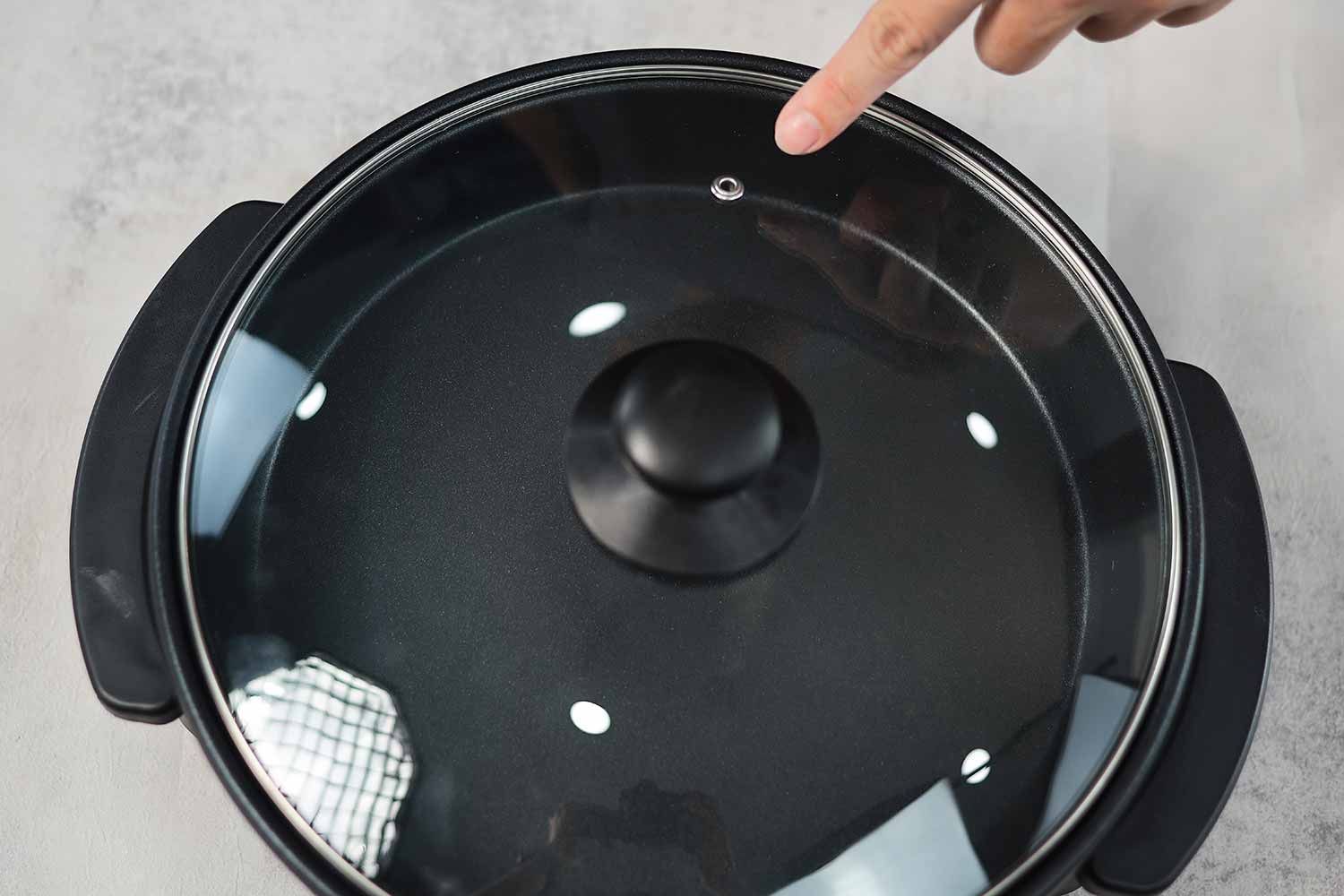
The tempered glass lid is dishwasher-safe (+4). It has a steam vent to release the pressure and a thermosetting plastic handle (+2). Since the pan is round, the metal edging is an easy fit (+3).
6.0 Base
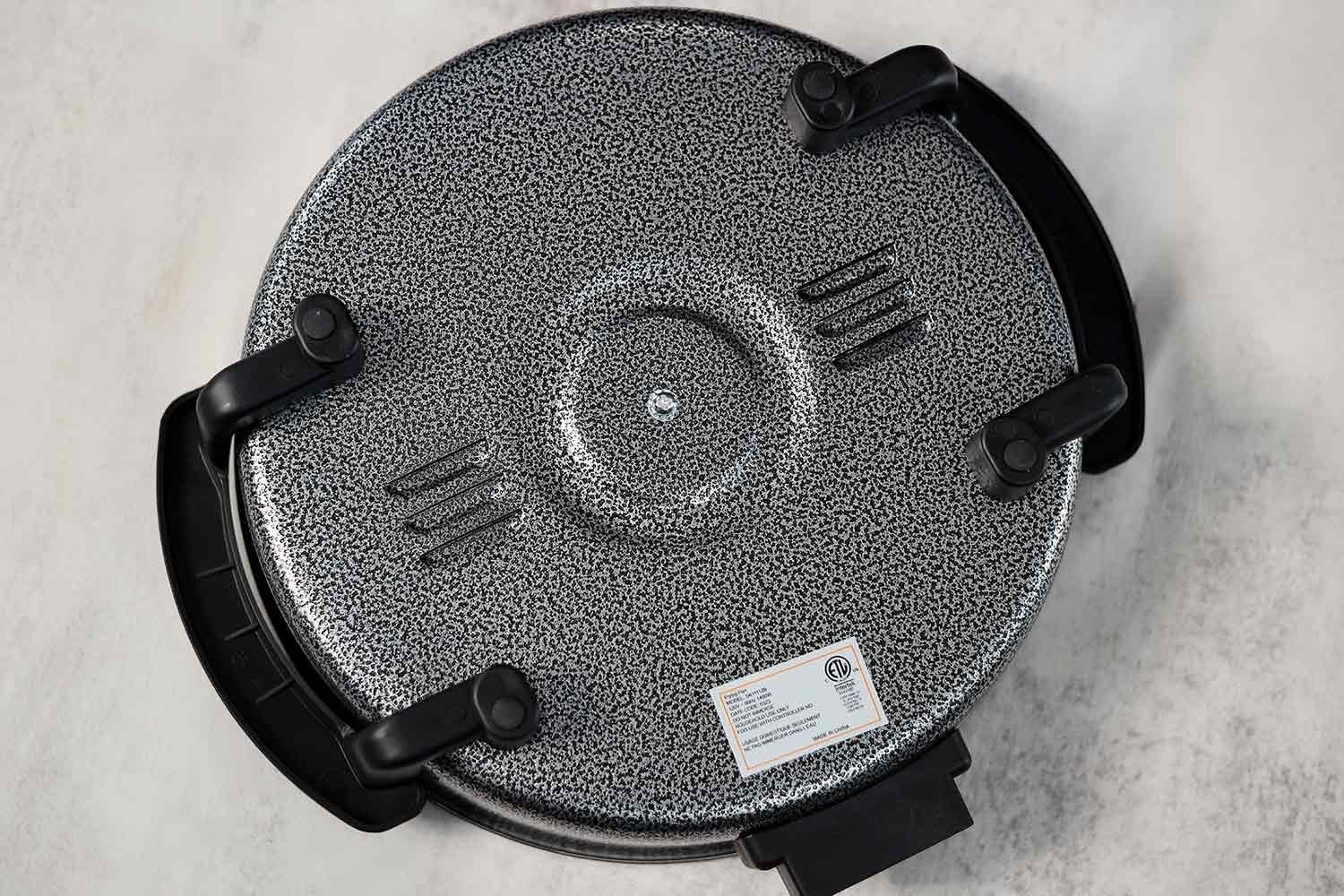
The thermosetting plastic base has four stands with anti-slip pads at the bottom (+3). Since the pan is not detachable, make sure your dishwasher is large enough to fit the entire skillet (+3).
5.0 Thermostat
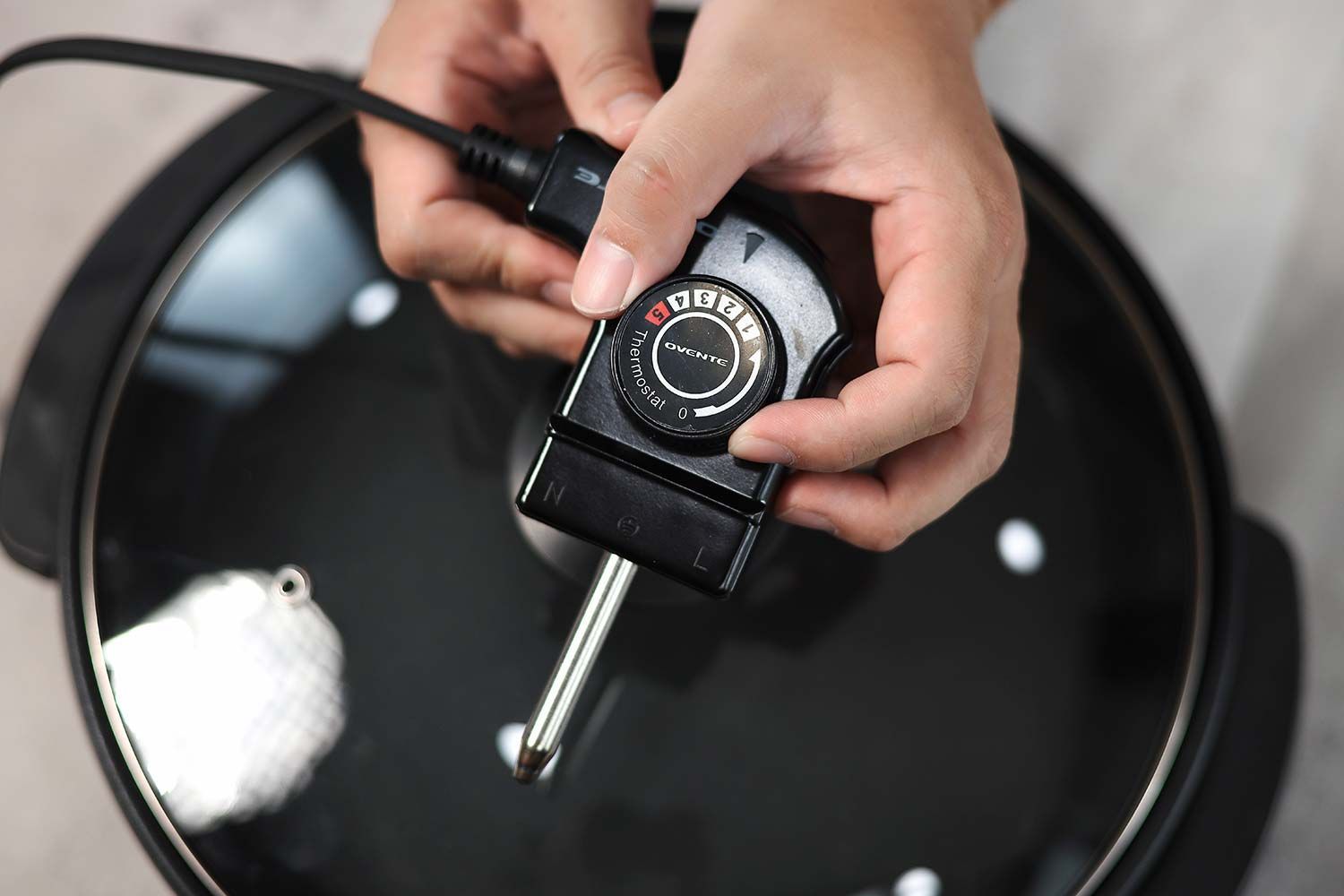
The detachable thermostat fits the socket tightly and has a working indicator light (+5). Like most other thermostats, you shouldn’t put it in the dishwasher.
The settings are numbered 1 through 5 rather than having set temperatures as with most other skillets (+1). The manual details the temperature oscillation range, but this is common with all skillets since they cycle on and off around the input temperature.
- 1: 219–367°F
- 2: 257–403°F
- 3: 304–439°F
- 4: 325–462°F
- 5: 329–480°F
In addition to these 5 settings, dialing between 0 (off) to 1 should maintain the skillet at around 150°F. If true, the Ovente should be good for different cooking methods than other skillets.
In our actual use, however, we noticed that the actual maximum temperatures were a lot higher than the manual stated. This was probably due to a faulty heat sensor and made the Ovente very tricky to use as you can see with the results in our performance tests (-1).
Power Cord
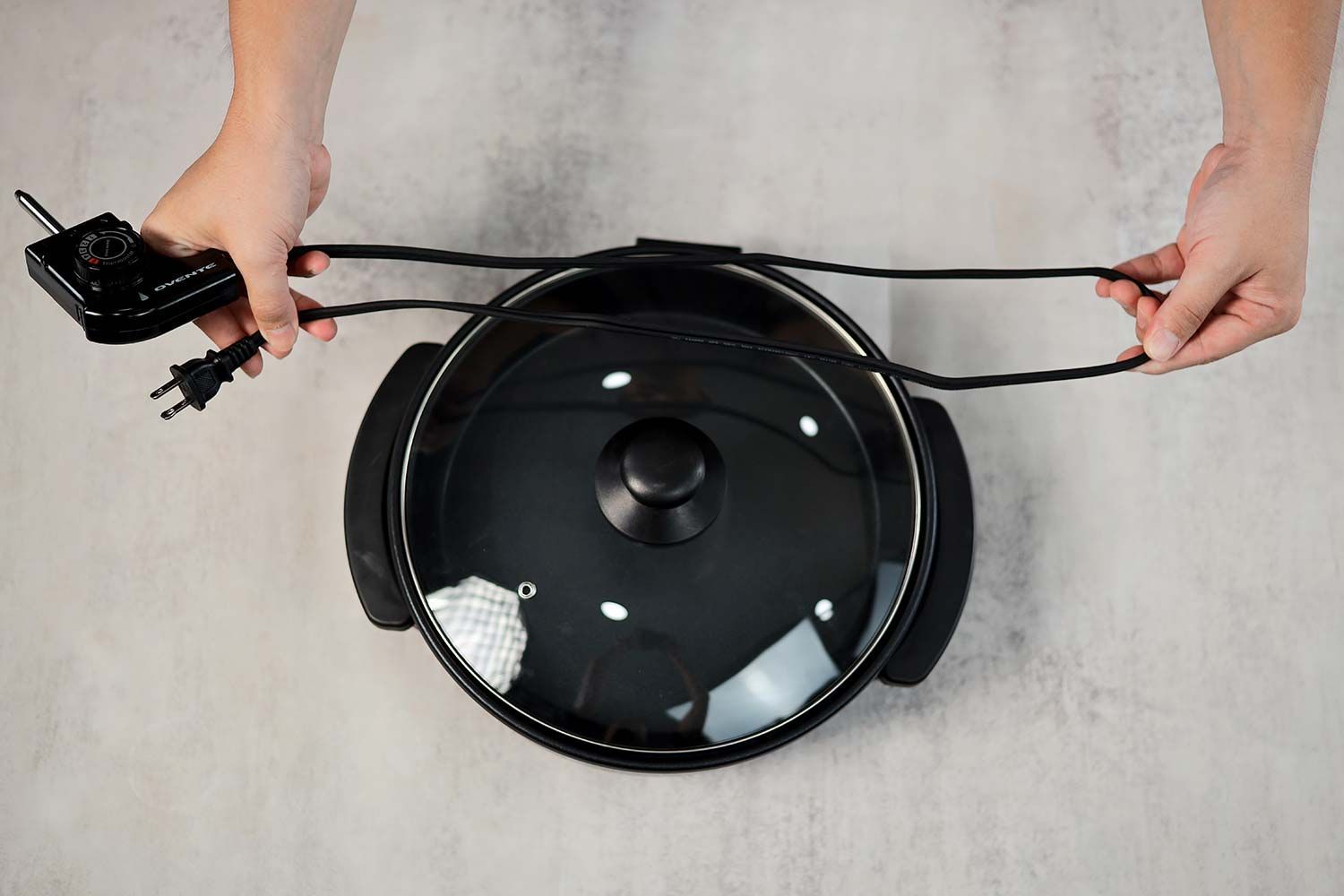
The power cord is a flat design and 40.94 inches long, which should be long enough for anywhere on or off the kitchen counter. It uses a two-prong plug which is commonly considered less safe than a grounded three-prong one.
6.2 Usability
The Ovente Non-Stick Electric Skillet SK11112B was the trickiest skillet to control out of all the ones we’ve tested in this product line. The silver lining is that it is safe to cook with, as well as easy to clean and store.
5.0 Ease of Use
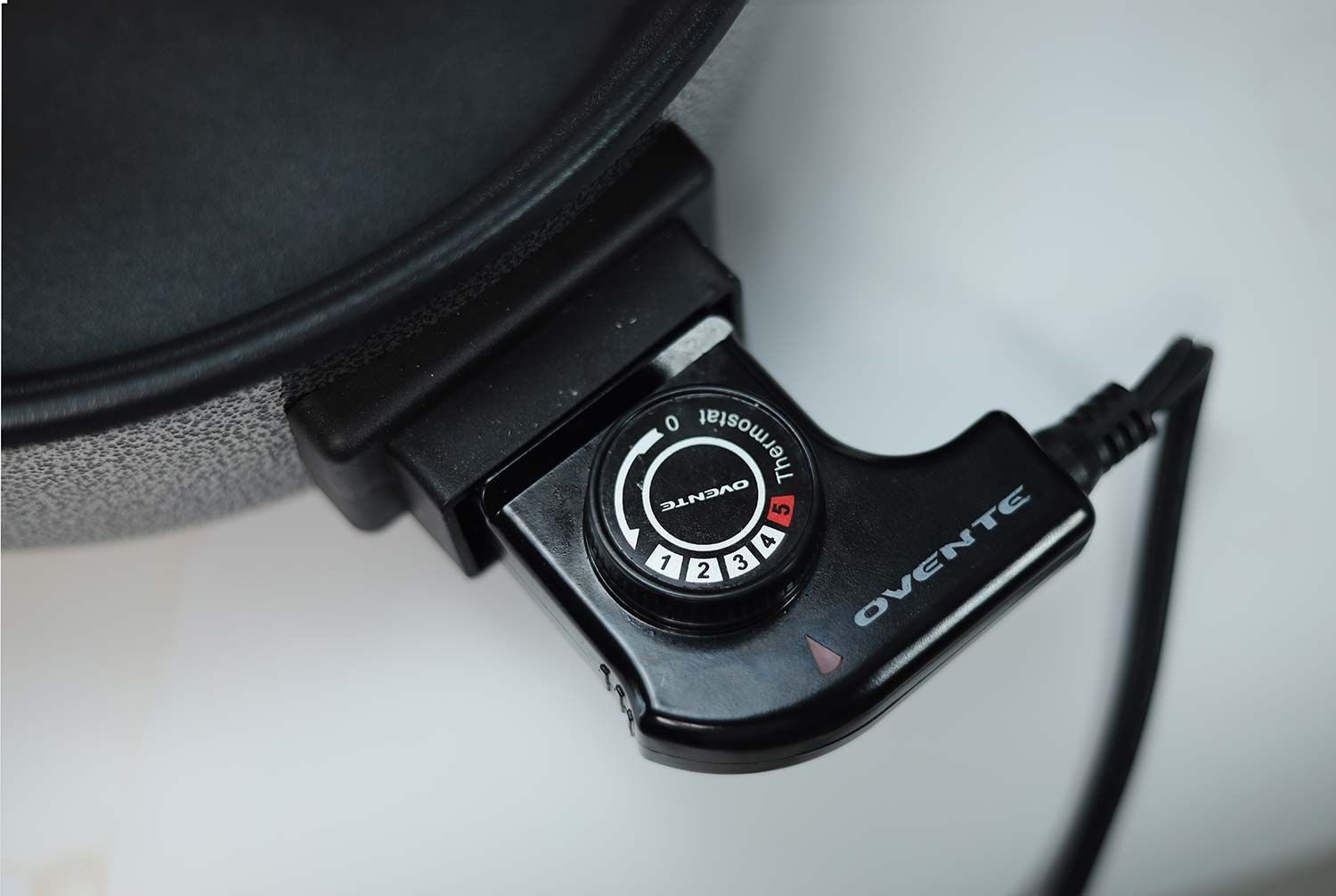
One issue with the Ovente is that we found the numbered temperature settings to be unintuitive (-1). More problematic were the imprecise and unstable temperatures (-1). In addition, the thermostat fits the socket a bit too tightly so you need to hold the skillet firmly to remove it.
On the bright side, the indicator light was easy to see (+1). Also, the skillet is very lightweight and the four thermosetting plastic stands with anti-slip pads gripped the counter surface firmly (+3). Finally, the double-wall feature prevents the exterior from getting too hot, thus reducing the chance of accidental burning (+3).
9.0 Cleaning and Storing
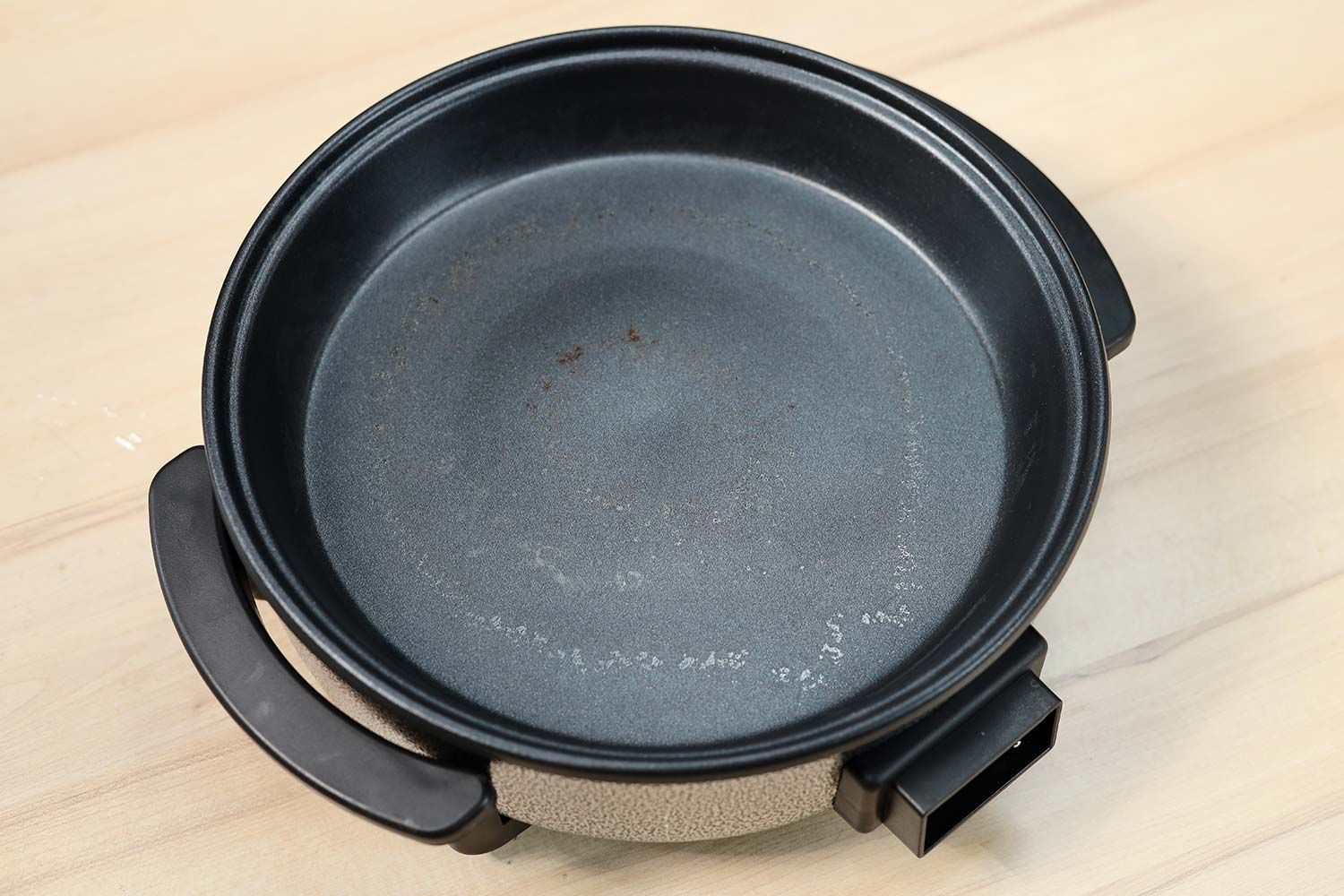
Despite the quality and design issues highlighted, we were happy that the non-stick coating of the Ovente released food without a problem—even the burnt caramel in our heat distribution test (+2). A simple hand-wash with warm water and dishwashing liquid should suffice (+2). Alternatively, everything except the thermostat can be cleaned in the dishwasher (+2).
Since it has some nooks and crannies, let the skillet dry completely before putting it back in the box (+3).